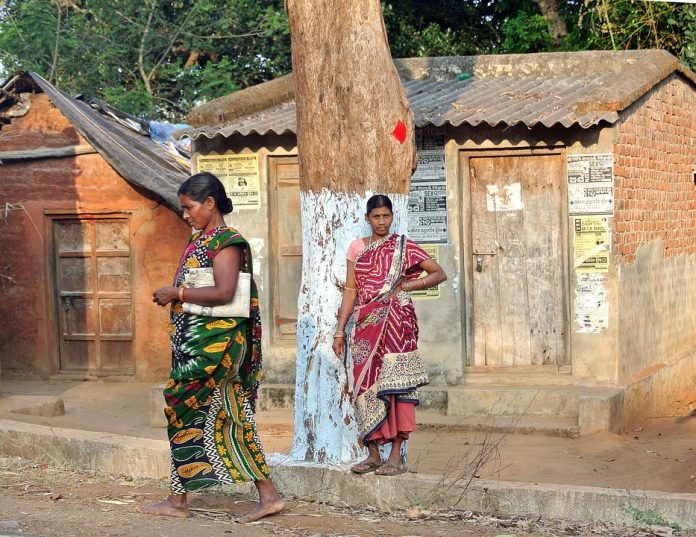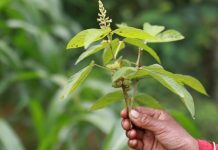The daily vendors faced a crisis due to the lockdown and their plight was reduced to vulnerability and marginalisation, as economically their situation is at stake which has affected their well-being. The district of Koraput is popular for the Eastern Ghats, the lush greenery and a pleasant weather almost the year, around 88% of population in Koraput district depends on agriculture and forestry. Since March 23, 2020 due to the closure of borders the tribal markets have been suffering as well as the vendors, specifically the tribal women vendors who accumulated the core area in the market. As Koraput has a blend of patriarchy and matriarchy, we come across the men and women both as breadwinners Women from the Soura, Bhumiya, Bhotra, Durua ,Mali, Bondas, Khonds, Koyas and Gadabas tribe constitute some proportion in the market. Here women are not confined to the kitchen or domesticity but are the ones who bring the bacon home. Every day, over 100 women have been working to earn livelihood seen selling forest products, fresh vegetables, fruits and flowers reach these markets early in the morning even by walking from different places due to lack of transportation and road connectivity. The Govt has provided necessary skills, income to women in the tribal-areas of Koraput district and also sponsor their travel to different national and international exhibitions for marketing their products and paving way for empowerment throughout the year. Earlier barter system was followed, but with the span of time they took their products to markets. The market here signifies the culture practised by the tribal inhabitants. There are many natural products from the daily provisions to natural produces available as well as other minor forest products, the tribal trade revolves There are several such weekly markets in the district where these women travel everyday to sell their products.
The Pandemic Era and Challenges
Distanced, Discriminated and distressed, reeling under the wake of pandemic we encounter that it becomes very difficult for these women to market their products as huge form of stigmatisation, prejudices are rampant among the buyers. During the normal times these tribal women were undergoing multiple troubles but the virus has magnified it to a certain extent. According to reports by International Labour Organisation (ILO), the pandemic has affected the informal sector which is equivalent to 195 million jobs lost. The street vendors are highly exposed to hazardous conditions with vulnerable conditions, being women, mother and a vendor she has a triple burden to survive. The rise in unpaid work among women has increased exponentially due to the covid. Even with the implementation of Street Vendors Act-2014 the numbers of beneficiaries are less and women are fewer. The rights of these women vendors should be protected which should not be a hindrance in the empowerment process, as per the National Commission of Women the gender based violence has risen in large amount in India due to lockdown and when women suffer from poverty as they cannot go to work it threatens their livelihood. One of the tribal women aged 25; married who sells vegetables in Semiliguda market in Koraput on anonymity voiced that poverty is much more dangerous than the virus, if they do not come out to sell their products; they will die as well as their children. Loss of sustenance have become a major challenge a 50 yr old tribal woman vendor at Koraput anonymously said she has been facing the hardest time of her life as apprehended between the paradox of poverty and pandemic. They have never thought the lockdown would continue for a longer period of time, which has hit them hard and their families.
The Alternative Solutions
Livelihood issues are more rampant which has made the women vendors more vulnerable, as they are everyday visiting the market due to somehow the covid stigma things are not taking a good turn, despite the social distancing and hygienic environment allotted by the vending committees prejudices among the masses are quite significant. Financially shattered, and a lack of mental well being has led the lives of these street traders in drudgery. Stripped of their livelihood and caught between work, pandemic and poverty, they are struggling to make their ends meet. Being women due to their lack of access to credit and other challenges they are surfaced with other additional challenges.
Meanwhile there has been a rise in online marketing of fresh vegetables from these traders which has been a very crucial step to curb the gap and the gendered implications as it can enable empowering culture among these street vendors. As Covid-19 has an economic toll on women vendors it has significantly marginalised them, but the growth of online shopping of these street products has been a welcome step for the betterment of their conditions. A tribal woman aged 26 who vends fish opined on anonymity at Koraput that the online marketing of products has been somewhat life saving for them, as the virus has affected severely their productivity.
The Negotiated Lives needs Remedial Ways
Another tribal woman aged 36 who trades flowers said their basic needs are also affected and people do bargain at times of covid. The bargained lives of these street vendors which is a culture where the buyers always negotiate for the products, requires adequate inscription there is a need to recognise them as they have struggled hard and these tribal women in Koraput , toil hard to earn their livelihood. Need to empathise with their struggles and challenges, strict measures like the use of masks and sanitizers for safeguarding them after post covid is an emergency and needed tool, Awareness and Sensitisation among these tribal women vendors on the streets by the media, NGO’S and civil society organisations should be an adequate step. Visible but unheard the tribal street vendors and their right to live is at stake, the need for social protection and their visibility in every form be it economic, psychological and social contexts is a vital and weighty consideration for their empowerment and should be the norm of the era and after.
Nupur Pattanaik teaches at the Department of Sociology, Central University of Odisha














